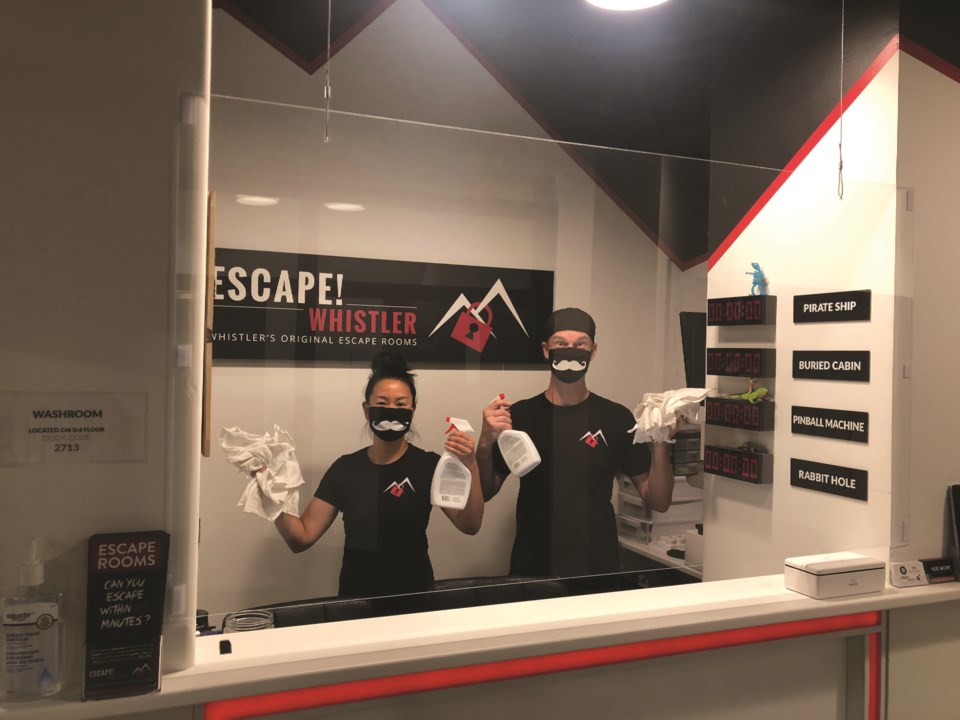At this time last year, Kori Klusmeier and the team at Escape! Whistler were in negotiations to expand their business.
“We had signed contracts and the wheels were in motion for the expansion, and we started building on Feb. 1,” Klusmeier said.
Then came March, and with it the COVID-19 pandemic.
“We shut everything down as of March 16,” Klusmeier said, adding that the business was closed for two months.
While guests are returning, Escape’s full complement of staff has not—only four of seven staff members have come back so far, meaning shorter operating hours.
Compounded with new COVID-19 measures like longer lead times between groups to facilitate rigorous cleaning (“we’re pretty much sponsored by Clorox right now,” Klusmeier joked), the business’ revenues have “paled in comparison” to what they were last year.
“So far in July we made about 50 per cent [of the] revenue we did July 2019, and this month, for August, we’re sort of tracking roughly around the same,” Klusmeier said, adding that Escape! Whistler was fortunate that its landlord took advantage of the federal government’s commercial rent relief program.
But as for the fall, and its anticipated slowdown?
“Oh yeah, we’re terrified,” he said.
“We’re trying to keep stress levels in control here, because you just don’t know. You can’t really predict, and that’s the scary part. The business levels are predicted to be at all-time lows for this fall season, which is terrifying when your costs are increasing because of the expansion.
“We’re nervous. We’re scared. But we’re trying to not pull our hair out completely, or what little is left of it.”
According to Priyanka Lewis, owner-operator of Brickworks, 3 Below and Main Street Noodles in Whistler Village, revenue is trending between 20- and 25-per-cent down so far—which could actually be manageable if it keeps up, and if the federal government continues its wage-subsidy program.
“I’m pretty happy with summer’s performance on the whole. But I think it’s just the uncertainty [of the fall],” Lewis said, adding that for food and beverage operators, “capacity is capacity.”
With its patio seating in the summer, Brickworks, for example, can comfortably seat 70, Lewis said. But what happens when winter weather forces everyone inside?
“We’re really trying to get creative, and we’re going to re-do tables, and move stuff around, and barriers and whatnot, but I still think we’re not going to get much past 40 seats in Brickworks,” she said.
“And even if we try and concentrate on takeout and all of that, I just don’t know whether we can make it.”
Factor in the annual flu season—which, in the midst of a global pandemic, will have every employee with the slightest sniffle staying home from work—and the uncertainty only grows.
And if Brickworks was to have a positive case, and be forced to close, as was the case at the Tim Hortons in Squamish on Aug. 7?
“If I have to do that, we’re done … How does that even work?” Lewis said.
“We don’t just have another team hanging around to reopen, and then what about those staff members? How are they going to survive?
“We can bury our heads in the sand and hope for the best, but hoping for the best isn’t going to prevent this inevitable situation that we’re going to find ourselves in.”
In an Aug. 13 letter to Pique, former Tourism Vancouver president Rick Antonson made the case for saving B.C.’s tourism industry, making three suggestions: “A strategic investment of $680 million to mitigate the impact of COVID-19 on our visitor economy, and reposition businesses for a future of job creation and service delivery; Provision of working capital recovery grants aimed at 2020 through 2022; and support funding for communities, businesses and associations to adapt marketing and visitor servicing to the new world of hospitality and tourism.”
Asked about Antonson’s letter, and if there are discussions about fall relief for tourism at the province, a Ministry of Tourism spokesperson said the government has worked in close partnership with the sector throughout the pandemic.
“Our government has taken significant actions to support people working in the tourism industry, for which we have received positive feedback from tourism stakeholders. But we know that these are challenging times and there’s more to do to support people and businesses,” the spokesperson said.
“Government is currently reviewing proposals for economic recovery and we look forward to sharing more on that in the weeks ahead.”
While Escape! Whistler’s new rooms have been predictably delayed, Klusmeier hopes to have them open by October.
“We’ve just sunk so much money and time and effort into these new rooms that I think we’re hoping that the local, Sea to Sky crowd who are familiar with our product already are going to be keen to try out the new rooms that we’re building. That in the end could end up sort of saving us,” he said, adding that he hopes Whistler’s small business community can pull through.
“This is going to be a real test for some businesses in town, and I know firsthand how hard people work at these small businesses, and how much of their time and life and energy and everything goes into their passion of trying to make their business as good as it can be.
“Hopefully the town survives.”




